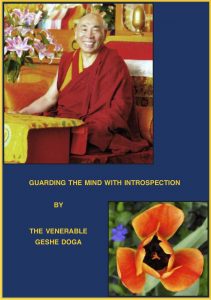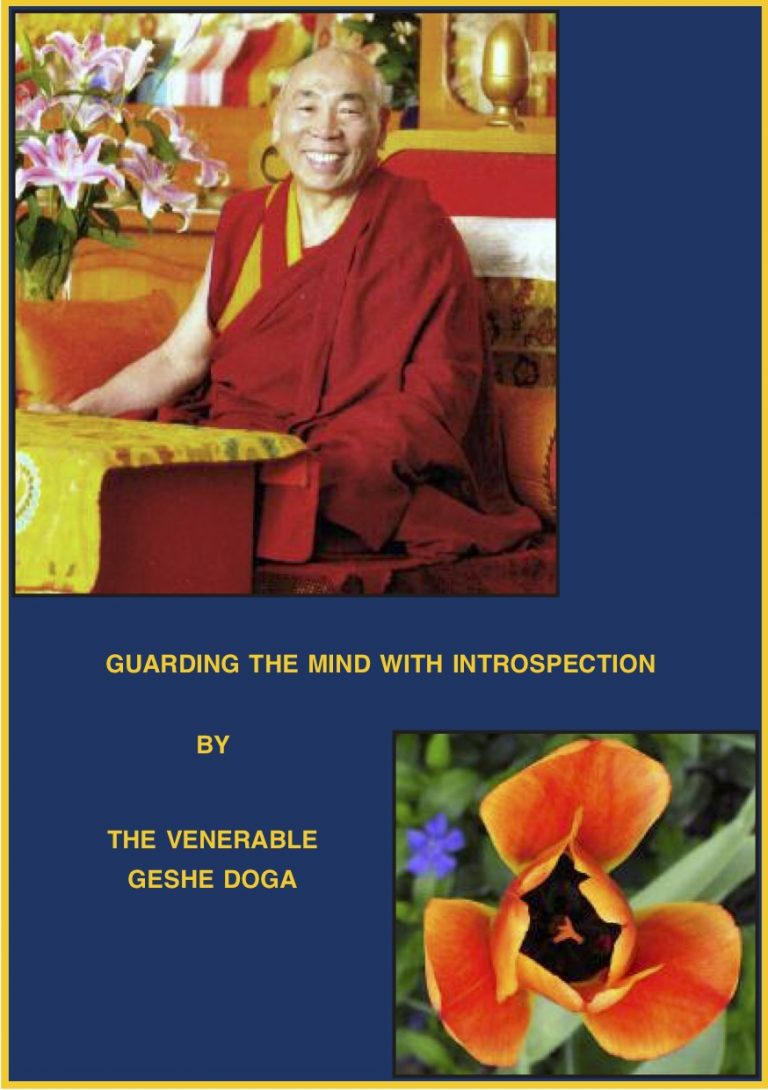| Guarding the Mind with Introspection are teachings given by the Venerable Geshe Doga during the 2006 Easter course at Tara Institute, Melbourne, Australia. Venerable Geshe Doga gave a commentary on the 5th chapter of the Introduction to the Bodhisattva’s Way of Life by Shantideva during the course. It explains the practice of guarding one’s actions with introspection. Translated by Ven. Fedor Stracke and republished by Happy Monks Publication in 2014.You can download the PDF of this publication here. |
Below is an excerpt from Guarding the Mind With Introspection
INTRODUCTION
 Please sit yourself comfortably in a good posture. You need to follow the three steps of having a good motivation, listening well and taking the meaning to heart. Therefore, please initially generate a good motivation for listening to the teachings, then listen attentively to what is being said and take the meaning of what has been said to heart.
Please sit yourself comfortably in a good posture. You need to follow the three steps of having a good motivation, listening well and taking the meaning to heart. Therefore, please initially generate a good motivation for listening to the teachings, then listen attentively to what is being said and take the meaning of what has been said to heart.
This teaching is a commentary on the fifth chapter of The Introduction to the Bodhisattva’s Way of Life by the great bodhisattva Shantideva, which is called Guarding with Introspection. Shantideva was a special person who had generated bodhicitta. This means that continuously, day and night, he wished others to be happy and free from suffering. He wished to benefit them and was always concerned with not harming them.
Even if one cannot be like Shantideva immediately, one should aspire to become like him gradually over time. Say to yourself: ‘I am starting today with training in the attitude that is concerned with the welfare of others. I am going to train in wishing others to be happy and free from suffering’.
The fifth chapter of The Introduction to the Bodhisattva’s Way of Life explains how to practise the higher training of morality with mindfulness and introspection. This explanation comes in two parts: Presenting the main body of the text and presenting the name of the text. The initial main outline, presenting the main body of the text, has four points:
- Guarding the mind as a method for guarding the trainings;
- Relying on mindfulness and introspection as methods for guarding the mind;
- The way of training in the practices with mindfulness and introspection;
- Other features of the training that make it perfect.
The sequence of these outlines eliminates doubts with regard to the sequence of practice. One has to guard one’s training to progress along the path. To guard one’s training one has to guard the mind. This leads to the question, ‘How do I guard my mind?’, which is answered in the next outline that says that mindfulness and introspection are the methods for guarding the mind. After that, it explains how actually to protect the mind with mindfulness and introspection. Then come other features of the training that complement it and make it perfect.
PRESENTING THE MAIN BODY OF THE TEXT
GUARDING THE MIND AS A METHOD FOR GUARDING THE BODHISATTVA TRAININGS BRIEF PRESENTATION
Those wishing to protect the trainings [1]
Protect the mind after focusing it strongly.
If one does not protect this mind
It is impossible for the trainings to be protected.
One definition of morality is: the mind of control; another is: the thought to abandon non-virtue. Protecting one’s training of morality is protecting the different sets of vows. It is not enough to just take vows, such as the vows of individual liberation, bodhisattva vows and tantric vows; they also need to be kept and the method for keeping the vows is to guard one’s mind. How does one guard one’s mind? One guards it with mindfulness and introspection.
Bodhisattvas, who wish to protect their trainings, protect their mind from wandering off to external objects after having focused it strongly internally. Without this, it will be impossible for them to practise the bodhisattva trainings.
Even though it explains here how to guard the mind with mindfulness and introspection in relation to the bodhisattva trainings, one needs to relate what one learns to one’s own practice. For example, everybody wants to develop qualities. We have made it our life’s work to develop qualities such as love and compassion,and to lessen faults such as anger. So why is it difficult to generate love and compassion, and, having generated these, why is it difficult to maintain and increase them? The answer is that the mind is not looked after properly with mindfulness and introspection.
First one needs to generate qualities and then these qualities need to be guarded so that they can abide and increase. If one allows one’s mind to fall under the control of anger, competitiveness, jealousy or pride then one’s qualities degenerate and one is not able to keep the continuity of one’s practices - one loses one’s love and compassion for others. Therefore, in the context of love and compassion it is important that we protect the mind with mindfulness and introspection.
One can observe a direct relationship between one’s happiness and the presence of love and compassion. If one has love and compassion then the mind is happy. But if the mind falls under the control of anger and one loses one’s love and compassion, then the happiness that one experienced is lost. Similarly, if the mind falls under the control of jealousy, competitiveness or pride, then the happiness that one previously experienced because of one’s love and compassion is lost. One can observe that a person under the control of negative emotions is constantly unhappy with everything. This is a very important lesson to understand.
If one treats animals such as cats and dogs well, they reply in kind by showing affection, which in turn makes one feel happy. One can see how much happier one will be if one treats other humans with love and compassion and one’s affection and kindness is returned by them. It is definitely possible to generate love and compassion for another person, even an enemy.
If one can cultivate love and compassion for the period of this life and prevent them from degenerating then one will receive very great benefit. For example, as we said, if one treats others with love and compassion one will be well-liked by them, which then generates joy and happiness. There are different ways in which one becomes happy through love and compassion, and by recognising their great worth one should generate a mind that values them.

